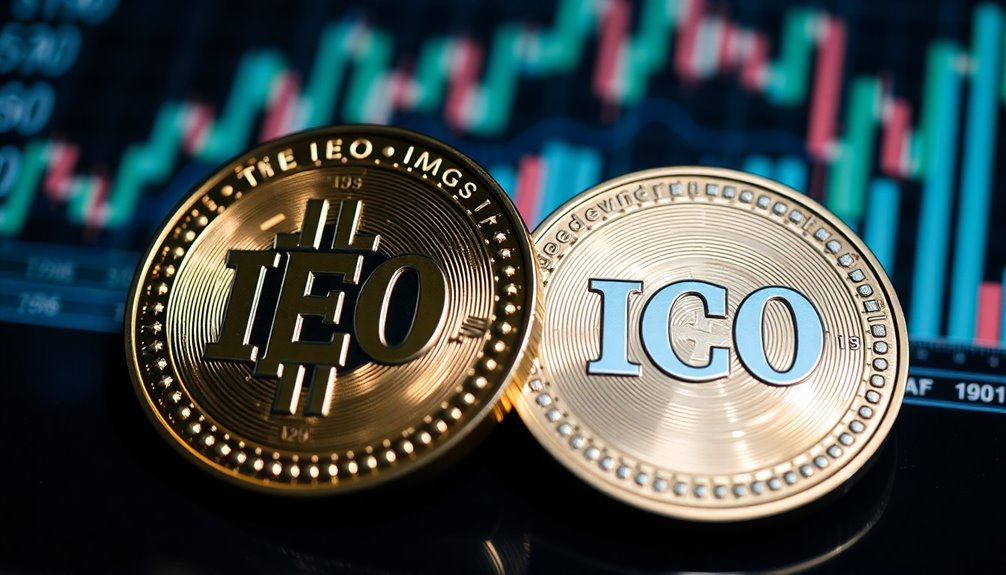An Initial Exchange Offering (IEO) is a method of fundraising where cryptocurrency tokens are sold directly on exchanges. Unlike traditional Initial Coin Offerings (ICOs), IEOs provide a more secure and regulated environment. You'll find that exchanges thoroughly vet projects, which reduces the risk of scams. To participate, you'll need an exchange account, and your purchase is often backed by stringent identity verification checks. Plus, IEOs offer immediate liquidity, allowing you to trade tokens right after the sale. If you're curious about the intricacies of IEOs and their advantages over ICOs, there's more to uncover.
Key Takeaways
- An Initial Exchange Offering (IEO) is a fundraising method for cryptocurrency projects conducted on regulated exchanges.
- IEOs involve thorough vetting by exchanges, reducing scam risks compared to traditional Initial Coin Offerings (ICOs).
- Participants must complete KYC and AML checks, enhancing security and compliance in the token sale process.
- Tokens purchased during IEOs provide immediate liquidity and instant trading once fundraising is complete.
- IEOs are favored for their marketing support and increased credibility due to exchange endorsement.
IEO Overview and Key Features

If you're looking to understand the world of fundraising in cryptocurrencies, an Initial Exchange Offering (IEO) offers a compelling alternative to traditional methods like Initial Coin Offerings (ICOs).
IEOs act as the cryptocurrency exchange's equivalent of an IPO, first gaining traction in January 2019 with Binance's Launchpad. They evolved from ICOs, incorporating greater legal oversight and regulations, which enhances credibility. Exchanges handle fundraising, marketing, and distribution for the projects, ensuring a more streamlined process.
Reputable exchanges carefully assess projects, ensuring compliance and reducing scam risks. IEOs provide immediate liquidity, allowing for instant trading after fundraising, stabilizing token prices.
This process not only simplifies fundraising for startups but also democratizes investment opportunities, making it easier for anyone with internet access to participate, while also boosting investor confidence through established exchange communities.
Fundraising Method for Tokens

When exploring fundraising methods for tokens, Initial Exchange Offerings (IEOs) stand out due to their structured approach and enhanced security. Exchanges thoroughly vet projects, ensuring they meet specific criteria, which boosts investor trust. This vetting process includes a review of the project's goals, team, and whitepaper. Additionally, IEOs leverage the exchange's established user base and credibility, providing marketing resources to support the token sale. As an investor, you can purchase tokens directly through your exchange account, often gaining early access at prices close to insiders. With immediate token listing post-sale, liquidity is high, allowing you to earn returns faster while benefiting from the exchange's reputation and compliance procedures. Furthermore, IEOs are considered a safer alternative to Initial Coin Offerings (ICOs) due to the regulatory environment they provide.
Token Sale Process Explained

The token sale process in an Initial Exchange Offering (IEO) is designed to ensure a smooth experience for both the project team and investors.
First, the project team submits a detailed proposal that includes their business model, use case, and a comprehensive whitepaper. The exchange then reviews this submission, checking technical infrastructure and market demand while ensuring compliance with regulatory standards. This process is crucial because IEOs leverage CEX user bases to enhance visibility and attract more investors.
Once vetted, the exchange lists the IEO, allowing you to buy tokens directly through your account. You'll need to verify your identity through KYC and AML checks before participating.
During the sale, tokens are sold at predetermined prices, and after the sale, they're distributed to your account, providing immediate market exposure.
Pros and Cons Summary

Participating in an Initial Exchange Offering (IEO) comes with its own set of advantages and drawbacks that you should consider.
On the plus side, IEOs offer trust and credibility, as reputable exchanges vet projects and handle regulatory compliance. This reduces the risk of scams and enhances investor confidence. Additionally, exchanges manage marketing efforts, which boosts visibility and saves time for issuers. Furthermore, IEOs provide a more secure environment compared to ICOs due to their enhanced regulatory frameworks.
However, there are downsides. IEOs can be costly, posing a barrier for smaller projects. They also risk fraud and manipulation, especially on less reputable exchanges.
Plus, limited participation to registered users may restrict your investment opportunities, and liquidity can be lower compared to traditional ICOs.
Weigh these factors carefully before diving in.
IEO vs. ICO Differences

While both Initial Exchange Offerings (IEOs) and Initial Coin Offerings (ICOs) serve as fundraising mechanisms for crypto projects, they differ significantly in their structure and execution.
IEOs undergo a thorough vetting process by exchanges, which helps reduce the risk of fraud. This scrutiny comes with higher costs, as exchanges charge hefty listing fees and take a cut from token sales. Additionally, IEOs are preferred by investors and companies for enhanced security and regulatory compliance.
In contrast, ICOs are generally cheaper since they don't require third-party platforms. IEOs provide immediate liquidity with tokens listed right after the sale, while ICO tokens may take months to reach exchanges.
Additionally, IEOs require exchange accounts for participation, unlike ICOs that are open to all investors regardless of their investment size.
Regulatory Compliance Issues

Navigating regulatory compliance issues is crucial for projects launching Initial Exchange Offerings (IEOs), as failing to adhere to legal standards can lead to significant setbacks.
Centralized exchanges enforce strict compliance protocols, conducting thorough due diligence on supported projects. This involvement reduces regulatory risk compared to other fundraising models like ICOs. Moreover, the increased oversight from exchanges helps to mitigate potential legal challenges that could arise during the fundraising process.
However, you may face compliance costs and regulatory hurdles, especially when dealing with varying standards across jurisdictions. Legal risks from non-compliance can impact your project's market performance and investor confidence.
Transparency is vital; exchanges require rigorous vetting to ensure legitimacy and maintain trust.
Ultimately, adhering to exchange standards not only ensures compliance but also enhances the likelihood of a successful IEO.
Emergence of Decentralized Exchanges

As the cryptocurrency landscape evolves, decentralized exchanges (DEXs) have emerged as a compelling alternative to traditional trading platforms. By August 2023, DEXs accounted for 14% of global trade volume, showcasing their rapid growth.
You'll find over 35 DEX options available, with monthly trading volumes exceeding $40 billion. Utilizing smart contracts, DEXs automate trades, ensuring transparency and security through blockchain technology. This means you maintain full custody of your funds, avoiding KYC and AML procedures while enjoying lower fees around 0.3%. DEXs also provide access to a diverse range of tokens, facilitating entry into cryptocurrency and supporting DeFi activities like yield farming. Furthermore, DEXs reduce counterparty risk by not passing funds through third-party wallets, enhancing user security.
They play a crucial role in shaping market prices and expanding trading opportunities.
Timing Your Token Launch

Timing your token launch is crucial for maximizing visibility and attracting investor interest. Consider launching during favorable market conditions to avoid downturns and volatility. Keep an eye on market cycles and trends, and align your launch with significant events in the crypto space for added attention.
Choose an exchange that matches your project goals and has a solid reputation. Coordinate with them for a launch date that maximizes exposure, steering clear of conflicts with other major IEOs.
Start your marketing campaigns early to build hype and engage with potential investors through various channels. Notably, launching through an exchange can provide enhanced security and credibility, further attracting investor interest. After the launch, monitor progress, communicate with your investors, and deliver on your roadmap to maintain confidence and foster long-term loyalty.
Frequently Asked Questions
How Does an IEO Impact Token Liquidity Post-Sale?
An IEO significantly impacts token liquidity post-sale by offering immediate trading on the host exchange.
You can swiftly trade your tokens, benefiting from higher liquidity compared to other methods like ICOs. The exchange's large user base boosts initial trading volumes, enhancing your investment's market presence.
However, keep in mind that long-term liquidity can fluctuate based on the project's performance; if it falters, you might struggle to sell your tokens at desired prices.
What Types of Projects Typically Use IEOS?
Think of the innovative minds behind groundbreaking tech; that's who typically uses IEOs.
You'll find projects that solve real-world problems, offering unique value that sets them apart.
Look for teams with a proven track record and industry expertise, often guided by influential advisors.
They aim for platforms like Binance or KuCoin to tap into vast user bases and achieve immediate liquidity, riding the waves of market demand and technological advancement.
Are There Any Fees Associated With Participating in an IEO?
Yes, there are fees associated with participating in the IEO.
You'll need to pay a registration fee of Rs 125 if you're in India, Bangladesh, Bhutan, or Nepal, or US$9 for students from other countries.
Some schools might add Rs 25 for honorarium and expenses.
However, students with major physical disabilities or whose parents were martyred during defense operations are exempt from fees.
Make sure to follow the payment guidelines provided by SOF.
How Can Investors Evaluate the Credibility of an IEO?
To evaluate the credibility of an IEO, you should start by researching the project's team and their track record.
Look for a comprehensive business plan that outlines market needs and revenue streams.
Check for regulatory compliance, including AML and KYC adherence.
Assess the technical quality by reviewing the product's security audits and open-source code.
Lastly, analyze market potential by understanding the competition and the project's unique advantages in addressing real-world problems.
What Happens if an IEO Fails to Meet Its Funding Goal?
If an IEO fails to meet its funding goal, you face serious consequences.
Financial instability can lead to loss of investor confidence and potential bankruptcy.
You'll struggle to secure future funding, and the project's credibility takes a hit.
This might force you to downsize your team, delay milestones, or even cancel the project altogether.
You could also face legal repercussions from investors and increased scrutiny from regulators, complicating your situation further.
Conclusion
In conclusion, an Initial Exchange Offering (IEO) offers a streamlined way to raise funds while ensuring token security and regulatory compliance. For instance, let's say a new gaming project launches its IEO on a popular exchange like Binance, gaining instant credibility and a built-in audience. By leveraging the exchange's resources, they not only attract investors but also create a strong community around their project. Ultimately, choosing an IEO can be a smart move for emerging cryptocurrency projects.









